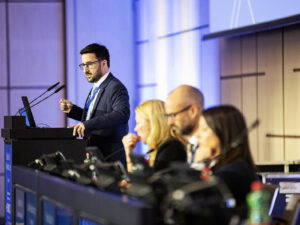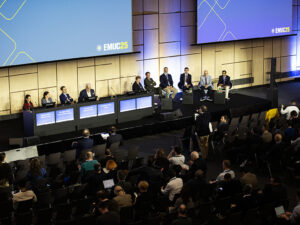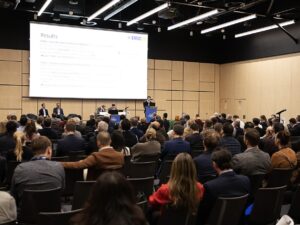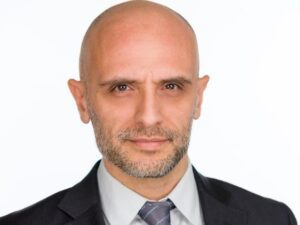“Onco-urology is a rapidly-evolving field. Next to classical systemic therapies such as androgen deprivation in prostate cancer or chemotherapy, immunotherapeutical approaches or newer, more potent antiandrogens are increasingly incorporated in the armamentarium of medical uro-oncologists,” says urologist Dr. Tobias Maurer (Hamburg, DE).
“It is up to well-designed prospective studies to determine their exact indication and place in the landscape in the treatment of metastatic uro-oncology patients. But established therapies and treatment regimens also need to be re-evaluated, for instance the duration of androgen deprivation in primary radiotherapy for localised high-risk prostate cancer.”
Dr. Maurer is co-chairing the ‘New Trials Update’ session at EMUC19, the 11th European Multidisciplinary Congress on Urological Cancers. This session will give participants an update on upcoming and currently running trials in onco-urology. Maurer: “The presented studies and data all serve to guide the practising urooncologist in their treatment decisions.”
EMUC19 is a collaboration between the European Society for Medical Oncology (ESMO), the European SocieTy for Radiotherapy & Oncology (ESTRO) and the European Association of Urology (EAU). Other chairs of the session are radiation oncologist Dr. Carl Salembier (Brussels, BE) and medical oncologist Prof. Aristotelis Bamias (Athens, GR).
Dr. Maurer currently serves on the Faculty of the Martini-Klinik Prostate Cancer Center at the University of Hamburg-Eppendorf, having joined in July 2018. Previously he was the Senior Attending Physician and Vice Chair at the Department of Urology of the Technical University of Munich. His current main focus is staging, surgical and medical treatment of prostate cancer.
EMUC19 will take place in Vienna (AT) on 14-17 November, also featuring the 8th Section Meeting of the EAU Section of Urological Imaging, courses by the European School of Urology and many more optional sessions and meetings. The annual EMUC congress is unique in its multidisciplinary approach to urological cancers, featuring speakers from a huge variety of oncology-related disciplines in an attractive and focused scientific programme.
Anticipating results
The New Trials session on Saturday morning (Plenary Session 7) will cover new and ongoing trials like SPCG4, ARAMIS and KEYNOTE 057. Each trial will be presented by a specialist from one discipline and then discussed with another specialist, highlighting the multidisciplinary approach that is favoured for onco-urological conditions.
Results of these trials are hotly anticipated by oncologists and urologists alike, according to Dr. Maurer:
“Although some of the presented studies have recently been presented at other meetings or published in full, updated data will be presented at EMUC19. In this respect, medical oncologists, but also radiation oncologists and urologists who treat onco-urology patients should clearly take the chance to attend this careful selected session to confirm and update their knowledge.”
“For example, in mRCC patients, the longer life expectancy makes sequential therapy likely. In this case the first-line treatment already strongly influences and guides sequential therapy, due to several approved classes of agents in metastatic renal cell cancer. Thus, several considerations have to be taken into account when choosing the initial therapy regime. The introduction of immunotherapy opened a whole new field of therapeutics especially in bladder cancer. For instance, Pembrolizumab could add a new potent option in BCG-refractory non-muscle-invasive bladder cancer.”
One example of a trial that will have an impact on daily treatment is the ARAMIS trial. Maurer: “It not only showed significantly increased metastasis-free survival with darolutamide compared to placebo in non-metastatic CRPC patients, but also significant advantages for overall survival, time to pain progression and time to symptomatic skeletal events. These are all relevant endpoints for men suffering from nmCPRC. At the same time an increase in incidence for adverse events was not observed.”
“These findings will likely soon impact daily treatment in this specific patient cohort. But, as mentioned above, the other presented studies also have guideline-changing potential.”
Emerging treatment options
Trials have a huge potential for changing guidelines and treatment options, according to Dr. Maurer: “These days medical oncologists, urologists and radiation oncologists face an increasing number of therapeutic possibilities for systemic treatment of prostate, bladder and renal cell cancer.”
“The trials presented at EMUC19 add significantly to our knowledge and will influence our insights on these diseases – which treatment sequence should be chosen in each individual patient or even if treatment is necessary at all and watchful waiting might be the best option. However, surely we can expect further advancements on our way to personalised and individualised cancer treatment in the future.”
As the EMUC congress represents the medical world’s commitment to multidisciplinary approach, onco-urological trials also reflect the cooperation of the involved disciplines.
“Within the last years we can observe an ever-increasing cooperation between the different medical disciplines in daily practice within interdisciplinary and even molecular tumour boards. Due to the increasing complexity of multimodal treatment regimens this is on the other hand a prerequisite for successful modern onco-urology.”
Dr. Maurer feels that the EMUC congress sets a great example: “It has been a great success since its introduction as a platform for mutual exchange between medical oncologists, urologists, radiation experts as well as (not to forget!) imaging specialists. The ESUI’s annual meeting has recently become a valuable ‘pre-congress’ to EMUC. As specialists, I think that we can all agree that multidisciplinary management of onco-urological patients is integral to our success!





